Explainer: 'I Speak Dutch, Not Flemish’

Knowing that the Netherlands and the northern part of Belgium both have Dutch as their official language, why do the inhabitants of these two neighboring countries run into so many instances where they just can’t seem to understand each other? Why do everyday words like pinnen and bietsen confound the Flemish and others like bankcontact, frigo, and bomma leave the Dutch with a furrowed brow?
Let’s put it this way: they may both speak Dutch, but no Belgian is blending in unnoticed among a group of Dutchmen, and the same goes for a Dutchman in Flanders (Belgium’s Dutch-speaking half). If a Belgian isn’t found out thanks to his unassuming behavior, his soft pronunciation and Flemish colloquialisms are sure to give him away. The same goes for the usually boisterous persona of the Dutchman, his extraordinarily pronounced ‘u’s and ‘ij’s and his insistence on calling cash withdrawals pinnen.

And while, yes, Flemish is technically Dutch, Dutch is hardly Flemish. Although Flemish – also referred to as ‘Belgian Dutch’ or ‘Flemish Dutch’ – is widespread and with tons of local varieties of its own, it isn’t so much a language as a collection of many different dialects spoken in the northern part of Belgium (Flanders). It distinguishes itself not only through a generally softer pronunciation but also through a bunch of expressions and colloquialisms that the Dutch simply do not have.
In 2012, the program ‘Hautekiet’ on Radio 1 (a Belgian public radio channel) presented Dutchmen with a short text full of Flemish words and sayings that they couldn’t make heads or tails of. The three paragraphs were shared widely on social media, and everyday words, such as bomma (grandmother), botten (boots) and fruitsap (orange juice), left Dutch people scratching their heads. While some of the terms belonged more to spoken language than written language, the point had been made. Of course, it also works the other way around – see the aforementioned pinnen and bietsen (to scrounge).

Things become especially tricky when both Flemings and Dutchmen use the same words, but with different meanings. An example that has caused plenty of confusion and missed meetings is voormiddag. While Flemings know it to mean late morning, the Dutch only know middag (afternoon). Then again, voor means ‘in front of’ or ‘before’ to both sides, so a Dutchman might easily assume a Fleming is talking about meeting up in the early part of the afternoon, say 1 or 2pm. When looking for reasons why so few mixed marriages occur between two nationalities that live in neighboring countries and speak – more or less – the same language, missed coffee dates may be one of the reasons.













